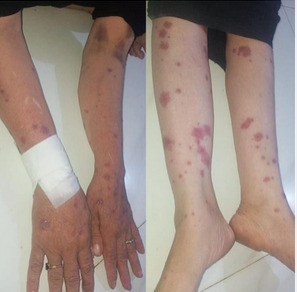Published on
Updated
Reading 2 min.
in collaboration with
Dr Gérald Kierzek (Medical Director)
After taking two ibuprofen tablets, a woman suddenly experienced swelling and multiple skin reactions, leading her to the emergency room. Is this common? Dr. Gérald Kierzek, emergency physician and medical director of Doctissimo, answers us.
No medication is 100% risk-free. A case reported by the scientific journal Clinical Case Resort confirms this again today: a 45-year-old Iraqi woman took two ibuprofen tablets to treat a flu-like illness, and found herself in the emergency room after an XXL reaction.
Swelling and crusting all over the face
After taking an anti-inflammatory which seemed benign to her, the woman suffered an impressive skin reaction. His face, lips and eyes notably doubled in volume, while becoming covered in scabs. More rashes began to cover his body. Rushed to hospital, the team diagnosed Stevens-Johnson syndrome, a rare and potentially dangerous reaction to taking certain medications.
The patient was admitted to intensive care, received an intravenous drip and was prescribed a course of antibiotics. Which allowed it to deflate in 7 days.


Stevens-Johnson syndrome: rare but serious
In their case study, the doctors explain that this syndrome can occur when the immune system overreacts to a trigger, such as a medication. “Stevens-Johnson syndrome and Lyell syndrome are two forms of the same potentially fatal skin disorder. It causes rashes, flaking skin and ulcerative lesions affecting all mucous membranes? It is a rare but serious syndrome” tells us Dr Gérald Kierzek, emergency physician and medical director of Doctissimo.
This is in fact caused by medications or by infections in patients who present the following risk factors:
- HIV infection;
- Compromised immune system: organ transplant patients, HIV/AIDS, and autoimmune disease (eg, systemic lupus erythematosus);
- Cancer: especially blood cancer;
- History or family history of Stevens-Johnson syndrome;
- Genetic factors.
Ibuprofen is not without risk (like all medications)
So should we be wary of the ibuprofen we have in our medicine cabinet? Nonsteroidal anti-inflammatory drugs (NSAIDs) are now widely used to relieve pain, but also fevers or inflammations. Although Stevens-Johnson syndrome is a rare phenomenon, it is nevertheless advisable to use ibuprofen with caution and moderation.
According to the National Medicines Safety Agency, ibuprofen and other NSAIDs “may mask signs and symptoms of an infection, such as pain and fever, and may delay proper treatment of the infection, which may increase the risk of complications“.
Researchers affirm that no drug is completely risk-free.
